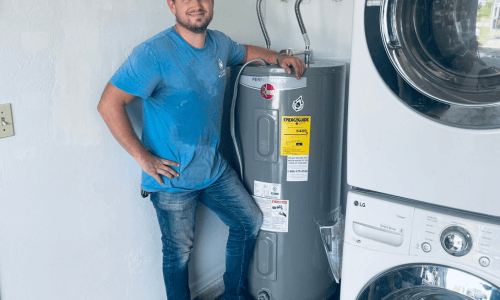
Helpful Tips for Tankless Water Heater Cleaning and Maintenance
Tankless water heaters have become increasingly popular for their energy efficiency and on-demand hot water supply. However, like any other appliance, tankless water heaters require regular cleaning and maintenance to ensure optimal performance and longevity. In this comprehensive guide, we will explore the essential tips for tankless water heater cleaning and maintenance, drawing insights from a seasoned professional at Local plumber.I. Understanding Tankless Water Heaters
Before delving into cleaning and maintenance tips, it’s crucial to understand how tankless water heaters work. Unlike traditional tank-style water heaters that store and constantly heat a large volume of water, tankless water heaters heat water on demand. When a hot water tap is turned on, cold water travels through a heat exchanger, where it is rapidly heated by either a gas burner or electric elements. This design eliminates the need for a storage tank and provides hot water instantly.II. The Importance of Regular Cleaning and Maintenance
Tankless water heaters, while known for their efficiency, can experience issues if not properly maintained. Over time, mineral deposits, scale buildup, and other impurities can accumulate within the heat exchanger, reducing efficiency and potentially causing malfunctions. Regular cleaning and maintenance can address these issues, ensuring your tankless water heater operates at peak performance.Tips for Tankless Water Heater Cleaning and Maintenance
Shut Off Power and Gas Supply:
- Before performing any maintenance, turn off the power supply (electricity or gas) to the tankless water heater. This ensures your safety during the cleaning process.
Flush the System:
- Over time, mineral deposits can accumulate in the heat exchanger, hindering heat transfer and reducing efficiency. Flushing the system helps remove these deposits.
- Connect a hose to the service valves and use a bucket to catch the water. Open the valves and allow a vinegar solution (white vinegar and water) to flow through the system for about 45 minutes.
- Rinse the system thoroughly by flushing it with clean water. This process helps dissolve and remove scale buildup.
Check and Clean the Air Intake and Exhaust:
- Ensure that the air intake and exhaust vents are clear of debris, dust, or obstructions. A blocked vent can lead to improper combustion and reduced efficiency.
- Use a vacuum or a soft brush to clean the vents. If you notice any damage, consult a professional plumber for repairs.
Inspect the Burner Assembly:
- For gas-powered tankless water heaters, inspect the burner assembly for any signs of corrosion, dirt, or rust.
- Use a soft brush to clean the burner assembly. If you observe significant corrosion or damage, it’s advisable to seek professional assistance.
Check and Replace the Water Filter:
- Tankless water heaters often have inlet water filters that prevent debris from entering the unit. Regularly check the filter for any buildup and clean or replace it as needed.
- Consult the manufacturer’s guidelines for the recommended frequency of filter replacement.
Test the Pressure Relief Valve:
- The pressure relief valve is a crucial safety component. Test it annually by lifting the valve’s tab to release a small amount of water. This action ensures the valve is functioning correctly.
- If the valve does not release water or shows signs of leakage, it may need to be replaced.
Inspect for Leaks:
- Check all connections, pipes, and fittings for any signs of leaks. Address leaks promptly to prevent water damage and maintain the efficiency of the system.
Verify Proper Combustion:
- If you have a gas-powered tankless water heater, ensure that the flame is blue and steady during operation. An irregular flame pattern could indicate combustion issues.
- If you notice any concerns with the flame, consult a professional plumber to inspect and address the problem.
Schedule Professional Maintenance:
- While many maintenance tasks can be performed by homeowners, scheduling periodic professional maintenance is essential. A plumber experienced with tankless water heaters can conduct a thorough inspection, identify potential issues, and perform advanced cleaning procedures.
Keep the Area Around the Heater Clear:
- Ensure that the area around the tankless water heater is free of clutter. Proper ventilation is crucial for efficient operation, so avoid placing objects near the unit.
Follow Manufacturer Guidelines:
- Always refer to the manufacturer’s guidelines and user manual for specific cleaning and maintenance instructions. Following these guidelines ensures that you don’t inadvertently void the warranty or cause damage to the unit.
Regular cleaning and maintenance are vital for ensuring the longevity and efficient operation of tankless water heaters. By following the expert tips provided by an expert at Local plumber, homeowners can address common issues such as mineral buildup, scale deposits, and potential malfunctions. Incorporating these practices into a routine maintenance schedule not only preserves the performance of your tankless water heater but also contributes to energy savings and a continuous supply of hot water when you need it.
Remember, a well-maintained tankless water heater ensures a continuous and reliable supply of hot water, contributing to the comfort and convenience of your home. Stay proactive, stay informed, and enjoy the enduring benefits of your tankless water heater!
Follow on Social: Instagram | Facebook




